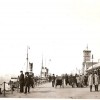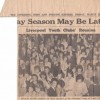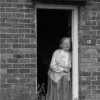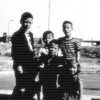THE FLYING DUTCHMAN by ROBERT EDWARDS
The war memorial in Arnhem, Holland was only finished in the late 1950's. It was a gargantuan task to see to the burial of the dead and record all of their particulars, and to reproduce the names and rank accurately. The names were eventually chiselled into the stone for permanence, and were mounted in orderly fashion by country, service and rank. To commemorate the inauguration of the war memorial, each country participated in appropriate ceremonies. In Britain the next of kin were invited to take part in the commemoration, and my mother and father were present to represent my Uncle Leslie, at the recognition of his premature passing in the defence of freedom in Europe.
We slept side by side at that time of our lives, under the care of protective parents, as in the whole world over. The cot was placed adjacent to the bed on which our parents slept, and a little below it, and there was a raised gate on the remote side to guard against myself or my sister Marie rolling off, and onto the floor of the bedroom. I can remember how my mother left the bedroom door slightly ajar, so that the gas-light from the bathroom landing could shine into the far corner of the bedroom, where it illuminated the large oak parquetry wardrobe where my parent's clothes were hung, carefully, so as not to crease them. The wardrobe gave off a faint odour of mothballs for most of the time that I can remember, and I am sure that it did so then. It was always dark in the bedroom at night; pitch black, in fact, in accordance with the law. The smallest chink of light shining into the street outside was a tell tale to the German Luftwaffe that they were on track for the Liverpool docks which would take the brunt of their pounding, although enough bombs were dropped on residential properties that many thousands of our people were hauled from the rubble, and many more carried the mental scars for the rest of their lives. Each room in the house was outfitted with closely fitting blinds which were scrupulously pulled down at dusk each evening.It was morning when I slowly started to stir. I could see the daylight from the window streaming into the bedroom. My mother had raised the blinds at some point earlier that morning, but I had been oblivious to it, sleeping the sleep of the innocent. Although it was later than my usual waking time, I was slow to move, but I was conscious of a pushing in my back, not powerfully, but persistently. I turned to look over my shoulder to see the face of my sister Marie. She was not looking at me, but at the double bed of my parents next to me. With her other hand she gesticulated toward the figure on the bed. "Look," she whispered. I turned and surveyed my father's form, covered with a bedsheet and the familiar gold coloured eiderdown. I sat up higher, and saw the back of the head of the sleeping form, and its close-cropped hair of light brown. A singlet covered the torso, and there was a tuft of dark hair at the armpit. I knew that my father wore pajamas to bed. This was not my father. I felt no fear. The figure did not stir. I could see also that Marie was not afraid, but that curiosity was urging her to move forward, slowly, to clamber over my prostrate body and onto the larger bed. She looked at me and giggled, and I climbed up beside her, where we could both view the male stranger at closer quarters. His arms were thicker than those skinny limbs of my father that were so familiar to us. The light brown hair was dishevelled, although the trace of a parting remained. His breath was regular, and he did not stir for the few minutes that we looked at him, giggling quietly under our breath. "Who's that?" The question was from me, expecting that my elder sister might have superior knowledge of this mysterious presence. "Dunno" she replied. We crawled around the other side of the bed to get a better vantage point. From the other side, we could see his face, clean shaven, younger than our father, and good-looking, although we could not see his eyes. Sensing our movements, and perhaps the giggling and chatter, that we had fought hard to control. the object of our curiosity stirred, stretched, and opened one eye. We were now eye to eye. Marie and I were silent. We watched. The figure pushed himself higher up on his pillow. We did not stir. "Hello", he greeted us. "Hello" came the response in unison. He smiled, and we giggled in return. We edged closer to the bed. "What are your names?" He did not speak as we did, or as our parents and their friends did. He had an accent, which increased his air of mystery. Big Sister bravely took charge. "I'm Marie, and his name is Bobby." She pointed to me. Silence for a few seconds. "Have you been there all night?" Marie asked. "Well, no, not really," came the reply. "I arrived late last night, and your mummy and daddy asked me to stay, because I had travelled a long way, and I had no way to go back to where I came from." We needed a few moments to digest this, but then we moved closer, so that we were both wriggling on his legs and feet, over the bedclothes. Marie and I lapsed into childish play, pushing and tickling each other for the benefit of the stranger and giggling ever louder. The stranger smiled indulgently. Eventually Marie stopped playing and turned to the stranger in the bed. "Well, what's your name?" The question was direct, and child like, without guile. It seemed fair that we should know his name if he had shared our bedroom and slept in our parents' bed. "I'm called Dirk." This sounded different than either of us had expected, and we tested him with the nearest English name that matched the sound as we heard it. "Dick?" we queried with puzzled looks. "No, my name is Dirk. It's Dutch." He was patient, for he knew that he was speaking to small children in unfamiliar circumstances. "What's Dutch?" The query came from me. Before Dirk could speak, Marie beat him to it. "He's from Holland. Dutch people are from Holland." I turned to Dirk, and received his smiling acknowledgement. "What do you do?" she followed up, unrelenting in her curiosity. " "I fly aeroplanes." This merited further consideration. Flying aeroplanes sounded like an important proposition. We knew that Germans flew aeroplanes and dropped bombs on Liverpool, and that we had an air force that fought with the German planes and shot them down. We were impressed, for we had never met anyone before who flew aeroplanes. We had only seen films and pictures in the newspaper, and we knew that some of our planes crashed and caught fire and the airmen who flew them sometimes died. Dirk spoke differently than we did, and his accent was quite noticeable, though pleasant, and not in any way threatening. Marie drew closer and shoved her hand under my armpit, and started to tickle me. I pushed her hand away. but she was determined, and she was older. I rolled over, but in vain. I was desparate, but I could still find a way out of this. "Lets tickle him," I exclaimed, pointing to our guest, and without a pause we both settled in for a bout of overenergetic play as a three-some. Dirk had no difficulty in repelling our childish aggression, and held on without flinching to his good-natured assurance, and without compromising in any way. The wave of excited assault, of windmilling arms and legs, of breathless endeavour, ran its course, and it ended when Marie chased me to the doorway. My mother was in the small kitchen on the main level at the rear of the house, six steps up from the street. She was busying herself with her kitchen chores, and looked up with a subdued smile as we two children appeared. Direct, and straight to the point, came the comment from Marie, as I watched inquisitively and supportively. "There's someone in your bed, Mum." My mother turned and watched us closely. "Did you wake him?" came the question. "No, Mum" we both answered in turn, solemnly. "Who is he, Mum?" It was Marie, taking the initiative again, and using her age and quicker wits to get the questions out which were on both our minds. My mother sighed and turned slowly to face us, as she explained. "The man in our bed is named Dirk de Vaal. He's a Dutchman in the Air Force, and he brought news of your Uncle Leslie." She turned away so as not to show us the tear in her eye which might have upset us. We had never met Uncle Leslie, older brother to our father. although his name came up over our dinner table from time to time. "He was killed by the Germans in Holland, and the Dutch people have buried him in a grave over there. Dirk brough us the news." She moved on, and took out some bread, as she settled down to the mundane activities of family life of WW-2. Dirk joined us later in the morning, after another short rest. In his RAF blue he was handsome, and he could not have been older than 22 or 23. My mother conjured up some breakfast, with boiled eggs, which I had rarely seen, and I was impressed with his VIP treatment. At various times other members of the family came to sit with him and to ask his opinion on the war, and how his family was coping with the problems of wartime. Of food rationing and shortages of everything, of the progress at the battle front, and how he got along with his comrades in the air force. When my father arrived after a day at work in the Shell oil refinery on the Cheshire side of the River Mersey, we ate dinner together. Dirk explained how he had been given directions to our home by my father's remaining brother, Bert, in Manchester, and that he had met my grandmother, who lived not far from Uncle Bert. He had borrowed money from Uncle Bert to take the train on this noble and unselfish errand. He did not think that he would be able to take the time to visit my father's sisters. Aunty Gwen lived in another part of Liverpool, and my Aunty Madge lived on a farm in North Wales with my cousin Trevor, one year older than myself. Her Welsh husband had tragically died from tuberculosis after drinking unpasteurised milk from a tuberculin cow. When evening came Dirk took his leave, and my father accompanied him to the railway station to catch his train. My grandfather and grandmother shook his hand warmly, and my mother and Aunty Hetty hugged him with thanks and wishes of good luck, emotions stimulated by the recognition of dangers shared, and of family separation. I never saw Dirk de Vaal again. My mother and father received a letter from him with further news of his war, and he expressed a desire to return to meet this family once again from the country that he had temporarily, but with such commitment, adopted. He never appeared again, and his fate was the subject of periodic speculation. We all knew that he was in a high risk business, himself most of all. Perhaps his memory is captured in a chiselled name in stone that appears on the great war memorial in his native country. Perhaps he married his childhood sweetheart and lived a long and contented life. Perhaps he realised his finest hours in those few short years of terror of WW-2, and spent the rest of his life broken and seeking solace in the bottom of a glass. I wish that I knew. Enter your story Back to main stories page |
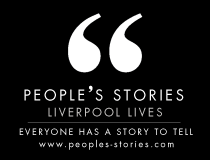
 Latest Pictures (view more) Latest Audio (view more) Concrete Oceans by John Reilly |
Useful resources
- Non Gamstop Casinos
- Casinos Not On Gamstop
- Siti Casino Online Non Aams
- Casino Non Aams
- Best Online Casinos
- Casino Sites Not On Gamstop
- Non Gamstop Casinos UK
- Non Gamstop Casino Sites UK
- UK Casino Not On Gamstop
- Online Casino
- Non Gamstop Casinos
- Non Gamstop Casinos UK
- Non Gamstop Casinos
- Casino Not On Gamstop
- Sites Not On Gamstop
- Casino En Ligne
- Sites Not On Gamstop
- Best Slot Sites
- Slots Not On Gamstop
- Best Non Gamstop Casino
- Non Gamstop Casino Sites UK
- Casinos Not On Gamstop
- Casino Sites UK Not On Gamstop
- Casino Non Aams Sicuri
- Casino Online Italia
- Meilleur Casino En Ligne Belgique
- Scommesse App
- Sweet Bonanza Fruits Avis
- 코인카지노 도메인
- 파워볼사이트 추천
- играть в Plinko
- Casino En Ligne 2026
- Meilleur Casino En Ligne 2026
- Casino Senza KYC
- Siti Non Aams Bonus Senza Deposito
- Meilleur Casino En Ligne 2026
- Meilleurs Casino En Ligne
- Siti Casino Non Aams
- Siti Casino Online Non Aams

